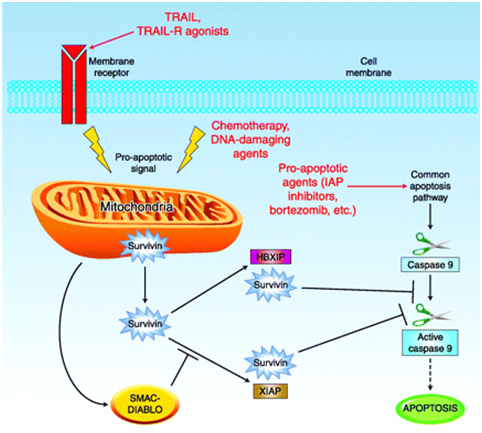SURVIVIN

Survivin is a unique inhibitor of apoptosis usually expressed in the embryonic lung and fetal organs in the developmental stages but undetectable in normal adult tissues other than the thymus, placenta, CD34+ stem cells, and basal colonic epithelial cells.
However, survivin seems to be selectively expressed in transformed cells and in most human cancers, including lung, breast, pancreatic, and colon carcinomas, soft tissue sarcomas, brain tumors, melanoma, neuroblastoma, and hematologic malignancies, among others. Genome-wide searches confirmed the differential expression of survivin in tumors versus normal tissues. Survivin expression can be deregulated in cancer by several mechanisms, including amplification of the survivin locus on chromosome 17q25, demethylation of survivin exons, increased promoter activity, and increased upstream signaling in the phosphatidylinositol 3-kinase or mitogen-activated protein kinase pathways. Additionally, the up-regulation of survivin expression in cancer cells seems to be independent of the cell cycle, suggesting an increase of its antiapoptotic role compared with normal cells, in which its mitotic regulation functions may be predominant.
Finally, the dynamic intracellular localization of survivin in tumors (i.e., cytoplasmic and nuclear) may serve as an indicator of survivin activity and as a predictive marker in several tumor types, including oropharynx carcinoma and astrocytoma. Overall, increased survivin expression in cancer patients is an unfavorable prognostic marker correlating with decreased overall survival in several malignancies, including non–small cell lung, gastric, colorectal, and breast carcinomas, neuroblastoma, and hematologic malignancies. Increased survivin expression was also associated with increased risk of recurrence, locoregional lymph node invasion, and metastasis.
Finally, survivin overexpression may be a predictive factor to determine response to chemotherapy and radiotherapy in patients with bladder cancer, breast cancer, multiple myeloma, and lymphoma. It is clear that the role of survivin in cancer biology far exceeds the simple inhibition of apoptosis. Because survivin has been implicated in the regulation of the mitotic spindle checkpoint, from kinetocore to spindle assembly, its overexpression in cancer may allow cells with spindle defects or misaligned kinetocores to continue through cell division. In addition to its direct role in carcinogenesis, survivin may also play a key role in tumor angiogenesis because it is strongly expressed in endothelial cells during the remodeling and proliferative phase of angiogenesis. Moreover, the antisense-mediated suppression of survivin during angiogenesis stimulates capillary involution in vitro.
Recent studies also suggest that survivin plays a role in tumor progression and chemoresistance. Survivin has been shown to inhibit cell death induced by several anticancer agents, including paclitaxel, etoposide, and tumor necrosis factor-á–related apoptosis-inducing ligand. In addition, NIH 3T3 fibroblasts treated with paclitaxel are protected from apoptosis when they express recombinant survivin.
In vitro and in vivo studies showed that inhibiting survivin reduces tumor growth potential and sensitizes tumor cells to chemotherapeutic agents, such paclitaxel, cisplatin, etoposide, gamma irradiation, and immunotherapy.


